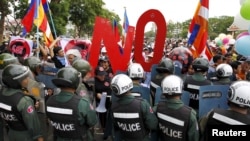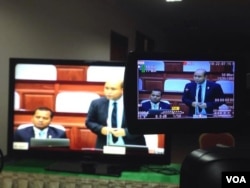Despite days of protests in the capital and mounting objections from the international community, ruling party lawmakers on Monday approved a draft law that will regulate the thousands of NGOs in the country.
Critics fear the law will be used to shut down or curtail the activities of organizations critical of the government.
US Ambassador William Todd has called the law unnecessary, and last week the European Union urged the government to withdraw it from consideration.
Sixty-eight National Assembly lawmakers from the Cambodian People’s Party, including Prime Minister Hun Sen and his son, voted in favor of the Law on Associations and NGOs. All fifty-five members of the opposition boycotted the vote.
Protesters in Phnom Penh say they opposed the law because it contains vague language that could help autocratic officials stymie the work of pro-rights and democracy organizations.
The law allows crackdowns on organizations that “jeopardize peace, stability and public order or harm the national security, national unity, culture and traditions of the Cambodian national society.”
The law must now be sent to the Senate for approval, before being signed into law by King Norodom Sihamoni.








